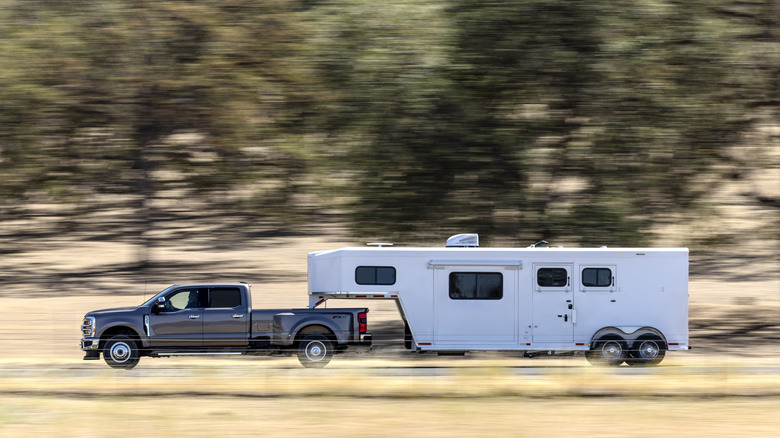
Diesel-powered trucks date back to 1923 when one of Karl Benz' early companies — Benz & Cie — installed a four-cylinder, 45-horsepower unit in a 5K3 truck chassis. It proved to be a winning combination that continues to dominate the heavy-duty truck market today, long after diesel-engined cars — which were also first produced by a Karl Benz concern – last had a moment in the sun.
The popularity of diesel cars was eclipsed by the fallout from Dieselgate, but that didn't seem to slow down diesel-powered HD trucks. In fact, commonly cited research from HDT shows that about 76% of heavy-duty trucks on the road in the U.S. today use diesel power, compared to 22% relying on gasoline engines. While electric big rigs are expected to match diesels on running costs soon, they still only make up about 1% of the country's heavy-duty fleet today.
Don't expect those numbers to change anytime soon, either. The truck-friendly characteristics of diesel engines — and environmental upsets heralded by California's emissions standards — should make sure of that.
It starts with the fuel itself. Diesel fuel is more power-dense than gasoline, meaning it contains more potential energy per gallon. In addition, diesel engines typically operate with a higher compression ratio, longer piston strokes, and higher-pressure turbos to create more torque than gasoline engines. Look at the 2025 Ford F-350. Its most powerful gas engine — a 7.3-liter V8 — delivers 485 lb-ft of torque that can tow up 29,500 lbs. The truck's most powerful diesel is a turbocharged 6.7-liter V8 with an earth-shaking 1,200 lb-ft of torque that's good for a top tow rating of 40,000 lbs.
Diesel engines are generally stronger and more durable than gas ones as well. After all, they have to be carefully engineered to hold up under those higher compression ratios and during tough jobs. Further, since diesels can make the same torque running at slower speeds than gas motors, they can operate under less stress in certain situations to potentially boost their life spans.
As for efficiency, well, that's another check mark for diesels. A recent Car and Driver test of used HD pickups, for example, noted that, "the diesel trucks we've tested burn significantly less fuel at highway speeds, averaging 20 percent better fuel economy" than gas pickups. Those advantages in power, durability, and efficiency make it seem like it's game, set, and match for using diesel engines in HD trucks. There are some real-world drawbacks, though.
 Nelson Antoine/Shutterstock
Nelson Antoine/Shutterstock
The key disadvantage of diesel engines is that they're more expensive to buy than gas engines and they're more expensive to run. This is even more true now that diesel fuel prices exceed regular gasoline prices. They also require more oil, and you have to add diesel exhaust fluid (DEF) on a regular basis.
That gets to perhaps the biggest problem with diesel-powered heavy duty trucks — DEF does reduce how much nitrogen-oxide gets released into the environment, but diesel engines still make crazy amounts of harmful emissions. There was even a mini-Dieselgate issue that saw Cummins hit with a billion-dollar penalty for cheat devices in Ram HD Trucks.
As it is, according to the American Lung Association, "heavy-duty vehicles represented approximately 6% of the on-road fleet but generated 59% of ozone- and particle-forming NOx emissions." Meanwhile, the Clean Air Task Force noted that "these emissions led to over 8,800 deaths, 3,700 heart attacks, hundreds of thousands of respiratory illnesses, and approximately $100 billion in monetized health damages across the country in 2023."
Nor are things likely to improve with the EPA's massive de-regulation efforts. It's almost as if someone out there thinks business trumps human health in this country.















